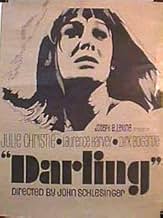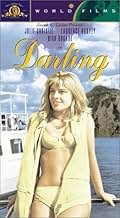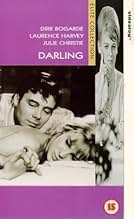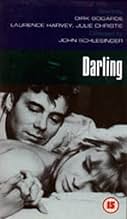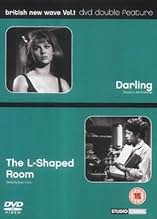NOTE IMDb
7,0/10
8,4 k
MA NOTE
Une femme mannequin superbe, mais sans aucune morale, couche pour réussir dans le monde de la mode londonienne à l'apogée des Swinging Sixties.Une femme mannequin superbe, mais sans aucune morale, couche pour réussir dans le monde de la mode londonienne à l'apogée des Swinging Sixties.Une femme mannequin superbe, mais sans aucune morale, couche pour réussir dans le monde de la mode londonienne à l'apogée des Swinging Sixties.
- Réalisation
- Scénario
- Casting principal
- Récompensé par 3 Oscars
- 17 victoires et 8 nominations au total
José Luis de Vilallonga
- Prince Cesare della Romita
- (as Jose Luis De Vilallonga)
T.R. Bowen
- Tony Bridges
- (as Trevor Bowen)
Avis à la une
Julie Christie deserved her Oscar. So did the scriptwriters--"Should Popes be ancestors?" And no on-screen sex when the film is considerably about sex!
When the lead character becomes a princess one is reminded of Princess Diana's own life. Both are Dianas. A very unusual, complex work from Schlesinger.
I did not appreciate the film when I saw it in the Sixties; now I do. What a great year for Christie--this and "Dr Zhivago."
The social commentary is hard hitting--young black boys serving snacks and drinks to perverted white adults, the facetious interest of the idle rich in feeding the hungry around the world as the rich gobble food they do not need to eat, of rich princes busy renovating their palace's washing closets.
When the lead character becomes a princess one is reminded of Princess Diana's own life. Both are Dianas. A very unusual, complex work from Schlesinger.
I did not appreciate the film when I saw it in the Sixties; now I do. What a great year for Christie--this and "Dr Zhivago."
The social commentary is hard hitting--young black boys serving snacks and drinks to perverted white adults, the facetious interest of the idle rich in feeding the hungry around the world as the rich gobble food they do not need to eat, of rich princes busy renovating their palace's washing closets.
To see this 60's landmark film is quite something. In many ways could be considered a period piece and at the same time it could have been conceived yesterday. Julie Christie's performance is the insurance "Darling" has to ensure its powerful sailing through the years into the forever ever. She is extraordinary! Schlesinger lets himself be guided by something other than his British restrain and fear of sentimentality here. He is tough and poetic telling us the story of Diana Scott (could had been Lady Diana Spencer to a T) with understanding and compassion but without trying to make her a sympathetic character. Julie Christie takes care of that in what, time will tell, in fact is already telling us, one of the best performances on film, ever.
"Darling", as it happens with most genuine works of art, it grows, it develops over the years and acquires a sort of clarity that, with the benefit of hindsight I will dare to call it, prophetic, as a social observation of its time. But what matters most is the film as a film. Brilliantly thought, written, directed, photographed and, of course, acted. Julie Christie became a symbol. She, clearly a very intelligent woman, surfed the waves of fame with an apparent detachment that I'm sure it's a sure sign of maturity and of a great respect for her profession and herself. If you think I love Julie Christie, you're right. But my love for her has to do with "Darling" and the age I was when I first saw it. The 60's were already in the past then but I saw them in the future, an immediate future.I can't imagine anyone, from any age, who loves film could be indifferent to this tale of isolation in a world moving fast towards an acceptable cult for celebrity. Not to be missed.
Julie Christie is "Darling" in this 1965 film directed by John Schlesinger, and also starring Dirk Bogarde and Laurence Harvey. Schlesinger does a beautiful job of showing us '60s London as it was, and yet he managed to make a film that is just as timely now.
Julie Christie is model Diana Scott, a gorgeous, ambitious young woman who moves from man to man without attachment and with the intention of helping her career.
She dumps her first husband and breaks up the marriage of a British journalist (Bogarde) and then moves on to a pleasure-seeking advertising executive (Harvey), and finally, marries an Italian prince.
It's one of those lives that sounds great - she has beauty, money, men, glamour, travels in the circles of the beautiful people. But she has no emotional attachments, no love, and nothing that she has feels right or is anything she wants. All the external trappings of celebrity, but it's a shell.
A really terrific movie, and I have to agree with the posters whose comments I read that Julie Christie is perfection in every way. Bogarde and Harvey give her excellent support. As an aside, Christie's wardrobe is stunning.
None of the characters are very likable, except perhaps Bogarde, who in spite of leaving his wife and family does truly love Diana.
Despite the cold realities of Darling, we're even more obsessed with celebrity today, which makes the film even more interesting. But when you look at a photo, see someone in a magazine or on the screen, you're only dealing with a persona, not the flesh and blood individual. It's a fantasy.
Darling shows the audience what's behind the fantasy - and it's not very pretty.
Julie Christie is model Diana Scott, a gorgeous, ambitious young woman who moves from man to man without attachment and with the intention of helping her career.
She dumps her first husband and breaks up the marriage of a British journalist (Bogarde) and then moves on to a pleasure-seeking advertising executive (Harvey), and finally, marries an Italian prince.
It's one of those lives that sounds great - she has beauty, money, men, glamour, travels in the circles of the beautiful people. But she has no emotional attachments, no love, and nothing that she has feels right or is anything she wants. All the external trappings of celebrity, but it's a shell.
A really terrific movie, and I have to agree with the posters whose comments I read that Julie Christie is perfection in every way. Bogarde and Harvey give her excellent support. As an aside, Christie's wardrobe is stunning.
None of the characters are very likable, except perhaps Bogarde, who in spite of leaving his wife and family does truly love Diana.
Despite the cold realities of Darling, we're even more obsessed with celebrity today, which makes the film even more interesting. But when you look at a photo, see someone in a magazine or on the screen, you're only dealing with a persona, not the flesh and blood individual. It's a fantasy.
Darling shows the audience what's behind the fantasy - and it's not very pretty.
Darling is known generally as an iconic "Sixties" movie. It is at once a product of its time and a still-born anachronism. Though conceived and shot in 1964-65, there is nary a hint of the Beatles and their ilk, who by the time this film went in front of the cameras were unquestionably the major pop cultural phenomenon on earth, and certainly in Britain where this story takes place. The characters who parade before us in this slickly packaged satire are far more evocative of the earlier "La Dolce Vita" period. Perhaps the newly emerging youthful counterculture is absent because the groupings visited here are, in contrast to the many- millioned teenage Beatles fans, older, more rarefied and further up the social ladder in corporate boardrooms, haute-couture industry gatherings, mainstream television production units, the profit-driven B-movie exploitation industry, and the haunts of continental royalty. Sparkling and memorable as it is, the musical scoring by John Dankworth was also dated by mid-1965 when this film came out.
The satire is often from the finger-pointing, underscoring school. Best example: A portly dowager in furs at a charity function stuffs an hors d'oeuvre into her mouth with a bejeweled hand as a speaker pompously thanks those present for fighting the scourge of hunger in the world.
Screenwriter Frederic Raphael and director John Schlesinger organize their material in semi- documentary fashion with voice-over narration by the title character, Diana Scott (Julie Christie) in order to reveal her hypocrisy as she describes various episodes in her life while the unfolding screen actions ironically contradict her words. She portrays herself verbally as innocent, sensible and basically decent when in fact she's selfish, dishonest and miserable. The underlying causes of her selfishness, dishonesty and misery are neither explained nor explored, but she is presented in a way that encourages us to regard her as a micro-consequence of the crass, materialistic, soulless macro-society around her. The episodes in her bumpy road to despair succeed one another briskly enough to keep us diverted and shaking our heads at the imperfect human types on display. The arc of the story takes Diana higher and higher on the material plane until she can rise no more, only to find emptiness at the top. The point seems to be "looks, money and prestige aren't everything – but look how entertainingly we're presenting that platitude."
This film and Doctor Zhivago, released shortly after, made Julie Christie the most honored and publicized actress in the world for about a year and it's interesting to compare her Diana Scott with her Lara character in David Lean's epic. Lean, a stern and experienced taskmaster, got more solid acting out of her. Schlesinger's grip is looser, resulting in a more uninhibited but less disciplined performance. As one flavor of the media-created "It" girls of the Sixties (Ann Margret, Twiggy, Goldie Hawn being other flavors) she embodied a certain attitude toward life that was in the air in the industrialized world in those days, an informality of demeanor which some would call proletarian or others would call "beatnik"; hers was a looser, more naturalistic look, a beauty outside the parlor. Julie Christie was beautiful without a speck of makeup while the wind was blowing her hair in four different directions and seemed to be an entirely different person depending on which angle she presented to the camera or what kind of light was bouncing off her partly chiseled, partly soft and sensuous features. Her very presence lent a depth that may not have been written into the character. With another actress, one can only wonder how effective this film would have been. Her chief fellow players, Laurence Harvey and Dirk Bogarde, give splendid support, as does the rest of the cast. But the spotlight is definitely on Julie; it is her showcase.
The satire is often from the finger-pointing, underscoring school. Best example: A portly dowager in furs at a charity function stuffs an hors d'oeuvre into her mouth with a bejeweled hand as a speaker pompously thanks those present for fighting the scourge of hunger in the world.
Screenwriter Frederic Raphael and director John Schlesinger organize their material in semi- documentary fashion with voice-over narration by the title character, Diana Scott (Julie Christie) in order to reveal her hypocrisy as she describes various episodes in her life while the unfolding screen actions ironically contradict her words. She portrays herself verbally as innocent, sensible and basically decent when in fact she's selfish, dishonest and miserable. The underlying causes of her selfishness, dishonesty and misery are neither explained nor explored, but she is presented in a way that encourages us to regard her as a micro-consequence of the crass, materialistic, soulless macro-society around her. The episodes in her bumpy road to despair succeed one another briskly enough to keep us diverted and shaking our heads at the imperfect human types on display. The arc of the story takes Diana higher and higher on the material plane until she can rise no more, only to find emptiness at the top. The point seems to be "looks, money and prestige aren't everything – but look how entertainingly we're presenting that platitude."
This film and Doctor Zhivago, released shortly after, made Julie Christie the most honored and publicized actress in the world for about a year and it's interesting to compare her Diana Scott with her Lara character in David Lean's epic. Lean, a stern and experienced taskmaster, got more solid acting out of her. Schlesinger's grip is looser, resulting in a more uninhibited but less disciplined performance. As one flavor of the media-created "It" girls of the Sixties (Ann Margret, Twiggy, Goldie Hawn being other flavors) she embodied a certain attitude toward life that was in the air in the industrialized world in those days, an informality of demeanor which some would call proletarian or others would call "beatnik"; hers was a looser, more naturalistic look, a beauty outside the parlor. Julie Christie was beautiful without a speck of makeup while the wind was blowing her hair in four different directions and seemed to be an entirely different person depending on which angle she presented to the camera or what kind of light was bouncing off her partly chiseled, partly soft and sensuous features. Her very presence lent a depth that may not have been written into the character. With another actress, one can only wonder how effective this film would have been. Her chief fellow players, Laurence Harvey and Dirk Bogarde, give splendid support, as does the rest of the cast. But the spotlight is definitely on Julie; it is her showcase.
Le saviez-vous
- AnecdotesThe "vox pop" TV interviews conducted by Dirk Bogarde's character with people in the street were all done with genuine members of the public, not actors, and were not scripted.
- GaffesWhen Diana and Robert quarrel and he leaves the apartment they share together, a microphone is visible on the left of the scene.
- Citations
Diana Scott: Taxi!
Robert Gold: We're not taking a taxi.
Diana Scott: Why not?
Robert Gold: I don't take whores in taxis.
Diana Scott: What do mean?
Robert Gold: That's what you are isn't it? A little whore! Isn't it?
- Versions alternativesThe original UK cinema version was cut by the the BBFC to remove shots of a man wearing a woman's corset and to heavily shorten a scene at a party in Paris where guests watch a couple making love on a hotel bed (the scene was edited to end the scene before the male partner appears). Video versions featured the same print though the cuts were later found and restored for the 2007 Optimum DVD release.
- ConnexionsFeatured in Film Review: Julie Christie & John Schlesinger (1967)
Meilleurs choix
Connectez-vous pour évaluer et suivre la liste de favoris afin de recevoir des recommandations personnalisées
- How long is Darling?Alimenté par Alexa
Détails
Box-office
- Budget
- 400 000 £GB (estimé)
- Montant brut mondial
- 25 444 $US
- Durée
- 2h 8min(128 min)
- Couleur
Contribuer à cette page
Suggérer une modification ou ajouter du contenu manquant




